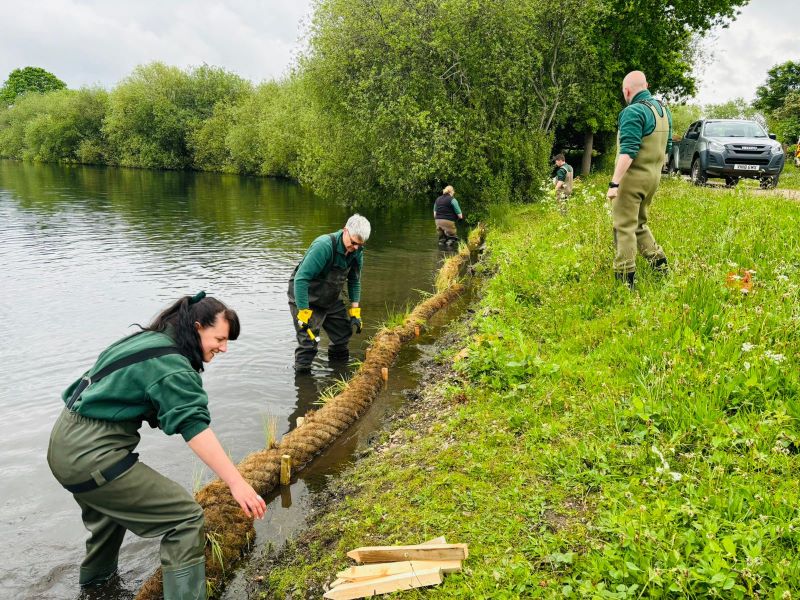Country Parks team wade in to install 240 metres of coir rolls at Kingsbury Water Park as part of on-going conservation and habitat creation work

Coir rolls installed as part of one of many conservation projects for Warwickshire Country Parks.
Colleagues from across Warwickshire County Council’s Country Parks service pulled together last week to install 240 linear metres of coir rolls around sections of the perimeter of three lakes at Kingsbury Water Park.
The rolls are made of coconut fibres and pre-planted with a range of native marginal plants: Purple Loosestrife, Pond Sedge, Yellow Flag Iris, and Soft Rush. They were fixed in place at the edge of the lakes and will create an excellent bankside habitat for a range of species, as well as improving water quality by taking up nutrients otherwise consumed by algae. The fungi and bacteria in the plants' roots help deal with pollutants and the plants capture atmospheric carbon and lock it into the lake sediments. The marginal growth also prevents bank erosion and helps the park look even more scenic.
This work comes as part of a wealth of recent conservation projects across Warwickshire’s ten country parks, greenways and nature reserves, led by the Country Parks team and a group of hard-working volunteers.
 In the north of the county, extensive work has been done at Pooley Country Park to improve the site for both visitors and wildlife. Overhanging Silver Birch have been removed to make pathways safe, with other Silver Birch removed to make room for English Oak in a technique known as ‘halo thinning’. The felled trees were chopped up and used to create habitat piles, an excellent home for many woodland species. The grasslands were also strimmed of Silver Birch saplings to create space for grasses and wildflowers to thrive.
In the north of the county, extensive work has been done at Pooley Country Park to improve the site for both visitors and wildlife. Overhanging Silver Birch have been removed to make pathways safe, with other Silver Birch removed to make room for English Oak in a technique known as ‘halo thinning’. The felled trees were chopped up and used to create habitat piles, an excellent home for many woodland species. The grasslands were also strimmed of Silver Birch saplings to create space for grasses and wildflowers to thrive.
In the south, a range of projects have taken place at Ryton Pools Country Park, including the creation of a new wetland scrape, funded by the Dunsmore Living Landscape Project at Warwickshire Wildlife Trust.
 The scrape is a shallow pond that will hold rain or flood water seasonally and stay damp for most of the year, creating an important habitat for a range of wildlife, some of which thrives in this specific environment. Its creation required the removal of the top layer of vegetation and soil with a digger, which then left an area ready for planting with plants including Marsh Marigold, Marsh Mallow, and Purple Loosestrife.
The scrape is a shallow pond that will hold rain or flood water seasonally and stay damp for most of the year, creating an important habitat for a range of wildlife, some of which thrives in this specific environment. Its creation required the removal of the top layer of vegetation and soil with a digger, which then left an area ready for planting with plants including Marsh Marigold, Marsh Mallow, and Purple Loosestrife.
 The project has been a real group effort: Warwickshire Fire and Rescue Service jumped in to support the project during a training day at Ryton Pools, using their pumps to remove excess water from the heavy rainfall so that the area could be planted, while corporate volunteers from Jaguar Land Rover (JLR) have helped plant hedges around its perimeter. The JLR team also helped with Ryton Pools’ own coir rolls project, supporting the install of 135 mm of rolls along the margins of the feeder pool and filling the gap between the bank and the rolls with over seven tons of aquatic soil.
The project has been a real group effort: Warwickshire Fire and Rescue Service jumped in to support the project during a training day at Ryton Pools, using their pumps to remove excess water from the heavy rainfall so that the area could be planted, while corporate volunteers from Jaguar Land Rover (JLR) have helped plant hedges around its perimeter. The JLR team also helped with Ryton Pools’ own coir rolls project, supporting the install of 135 mm of rolls along the margins of the feeder pool and filling the gap between the bank and the rolls with over seven tons of aquatic soil.
The team hopes that these efforts will create excellent habitats for a range of pollinators, such as bees, butterflies, moths, beetles and flies, and semi-aquatic invertebrates such as damselflies, dragonflies, and solider flies, as well as provide a spectacular palette of colour for visitors.
Mark Ryder, Executive Director for Communities at Warwickshire County Council, shared:
“It’s fantastic to see the collaborative efforts of our Country Parks team and volunteers from across the community making such a tangible impact on our local environment. These conservation projects not only enhance the natural beauty of our parks but also play a crucial role in supporting biodiversity and combating the impact of climate change. By creating these new habitats and improving existing ones, we are ensuring that Warwickshire’s green spaces can be enjoyed by both wildlife and people for generations to come.”
By creating these new habitats and improving existing ones, we are ensuring that Warwickshire’s green spaces can be enjoyed by both wildlife and people for generations to come.”
Warwickshire Country Parks is always looking for volunteers to help take care of its parks; find out more at https://countryparks.warwickshire.gov.uk/countryparks/volunteering.



